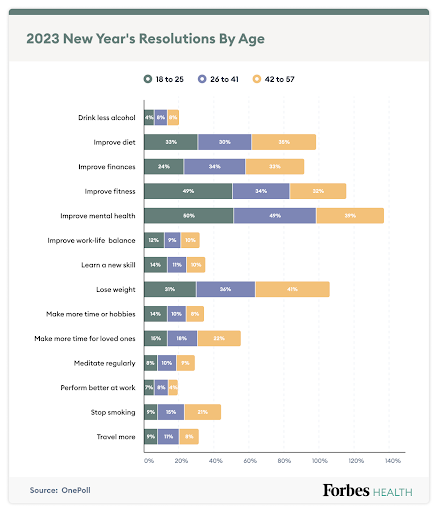As the new year has approached us many people set up resolutions to improve themselves physically and mentally. Each year the resolutions change according to where people are in their lives but some of the most popular resolutions that repeat each year are to save more money 50% and to exercise more 50%. Some resolutions that come and go every year are to lose weight and to spend less time on social media. Between the ages of 18 and 25 improving mental health resolution was one of the most popular goals for that age group. 26 to 41-year-olds have the goal to lose weight and improve their money saving as their top goal. Often, people start off the new year with a confident attitude and a lot of motivation but end up giving up within the next few months. “If I don’t end up starting strong with my resolution I usually forget about it and retry next year” -Marla Brown
Many older people pick to save money as their resolution because over half (56 percent) feel behind in their retirement savings. While 37 percent are hopeful that their financial situation will improve in 2024, 26 percent believe that it will get worse. Resolutions often fail because of unrealistic expectations, lack of planning, lack of support, and perfectionism. Setting unrealistic goals that are difficult to attain within a specific timeframe. Additionally, a lack of motivation, discipline, and accountability can contribute to the failure of resolutions. Sometimes, people may also underestimate the challenges they will face or encounter unexpected obstacles along the way. It is important to approach resolutions with a realistic mindset, break them down into smaller achievable steps, and stay committed throughout the year to increase the chances of success.

Many different statistics indicate that approximately half of Americans make New Year’s resolutions, but only a small 8% manage to stick to them. Once you’ve established a realistic objective, the next step is to devise a strategy to attain it. This strategy should outline specific actions, such as planning meals and incorporating exercise routines. A strong support system can greatly impact your success in achieving weight loss goals. This can come from friends, family, or even an online community. Having individuals who understand and motivate you throughout your journey can provide the necessary drive and accountability. Lastly, it’s important to remember that sustainable weight loss requires time and patience. It’s not a quick fix or a one-time effort; it necessitates consistent dedication and perseverance. Keep pushing forward, even if you don’t see immediate results or encounter obstacles along the way.







